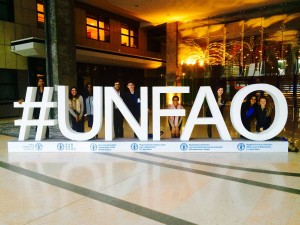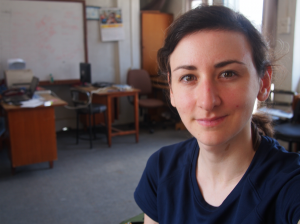When you’ve just finished your first year of graduate school, then you might know that while you may have spent the past year opening your mind to new ideas, you probably also spent it being a know-it-all. Because let’s face it, if you don’t seem to know it all, who’s going to listen? Any sign of weakness in your speech is seen as a weakness of your ideas. At the end of last semester, I read an opinion piece shared by a fellow student on the use of the expression “I feel that,” critiquing the way people choose to express their ideas as if it makes a good idea worthless.
So there I was little miss know-it-all, in training with The Advocacy Project trying to keep my know-it-all reflex from turning me into the pariah of my fellowship. Now I’m back in the real world and some humility is in order, but how much is too much?
During my first meeting with Bijaya Sainju, the founder of CONCERN Nepal, he asked me what my expertise were. Suddenly during this casual introduction over coffee I was transported to another dreaded interview-like scenario and my mind went blank. I’d spent the past year studying international development and economics, but everything I learned felt paltry compared to the 20+ years he’d spent working on issues of child labor. In my previous post, you might have read about my “shiny new tool box,” but in the face of so much experience my skills suddenly felt like a little tikes playset. In response to his question I spoke a little bit about the 4 years I spent at my law firm assisting on cases and with research for articles. I didn’t mention the past 9 months that I had spent studying the issues he has dedicated his life to fixing.
Looking back, I now think I sold myself a little short in this initial meeting. I may not know it all, but I do know a little. After talking with Bijaya and Iain more and getting my intimidation under control, I’ve realized there are things well within my capabilities and time frame that I can do to help CONCERN Nepal work toward its mission of eliminating the worst forms of child labor. Right now CONCERN Nepal has enough funding to support 25 children through school so they do not have to return to working in the brick kilns. In order to increase their funding, I’ll be working along side Bijaya and his team to make this small program a model for something larger and more widespread. This is my goal for the summer and I look forward to writing more about CONCERN, my work, and Nepal in general.
Posted By Lauren Purnell
Posted Jun 9th, 2016




7 Comments
Hannah Chi
June 9, 2016
It sounds like this has already been an eye-opening experience! I know AP is so excited to have you in Nepal right now, and it’s great to hear that you’ve set some personal goals for yourself and you know how you want to contribute. Can’t wait to hear about the rest of your journey!
Rita
June 12, 2016
Very clear goals Lauren, I’m sure you will be doing great! It would also be interesting to see where children who received support from CONCERN haven gone after a year or two in school. Have most of them continued to finish school or dropped out and resumed working in brick kilns? A statistics on the drop-out rate could help determine the effectiveness of the current model, and help the AP team work on seeking long-term funding for CONCERN. Look forward to hearing more stories!